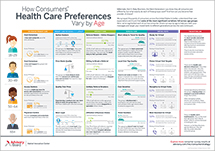Auto logout in seconds.
Continue LogoutAppendix removal is the most common emergency surgery in the world, but a new study published in JAMA suggests that antibiotics—without surgery—might be effective treatment for uncomplicated appendicitis.
How virtual reality and augmented reality could change medical imaging
'Is surgery really necessary?' researchers ask
Immediate surgery has long been the preferred treatment for appendicitis, due to concerns that the appendix could burst and put the patient's life in danger, according to the Associated Press.
But advances in medical imaging have helped providers determine more easily whether the appendix might burst. Past studies have indicated that in such cases surgery to remove the appendix isn't always necessary, though findings of earlier research did not address the long-term effects, according to the New York Times' Nicholas Bakalar.
With those new innovations in hand, researchers in Finland sought to determine whether appendicitis patients benefited from nonsurgical treatment over a five year period. For the study, researchers for five years followed 530 patients who had uncomplicated appendicitis, meaning the appendix had not ruptured and there was no fecal blockage. About half of the patients received antibiotics without surgery, and the other half received the standard surgical treatment.
Most patients were OK with antibiotics
Of the patients who received just antibiotics, around 60% never required surgery for their appendicitis.
Of the 100 who did ultimately receive surgery, 70% had it within the first year of taking the antibiotics, and none of the patients had adverse outcomes related to delaying the surgery.
In addition, the survey found patients who underwent the surgery right away were more likely to experience complications than those who delayed surgery and first used antibiotics. About one in four patients who received the standard surgical care had complications, such as infections at the incision site, abdominal pain, and hernias. By contrast, just 7% of patients who had antibiotics had complications. Further, patients who received antibiotics averaged 11 fewer sick days than surgery patients.
However, the surgeries in the study used conventional incisions rather than the "keyhole" surgeries used in the United States that are considered less invasive.
Overall, the researchers found treatment costs during the first year were about 60% lower for patients who had antibiotics than for patients who had surgery.
'A new era of appendicitis treatment'
Paulina Salminen, lead author on the study and a surgeon at the University of Turku in Finland, said this study shows antibiotics are a "feasible, viable, and a safe option" for appendicitis patients. "If I have a CT scan, and I can see that the appendicitis is uncomplicated, I would discuss with the patient the possible results of antibiotic treatment alone or surgery," she said. "Then we would make a joint, unbiased decisions about what would be best."
In an accompanying editorial, Edward Livingston, deputy editor at JAMA, described the findings as "a new era of appendicitis treatment." He added that the findings "dispel the notion that uncomplicated acute appendicitis is a surgical emergency. Given that access to a surgeon is not always available, these results may have implications in many different settings and in many different countries."
Giana Davidson, a surgeon at the University of Washington, is involved in similar research regarding the benefits of antibiotics versus "keyhole" surgery. She said that the results of this study are "a critical piece to the puzzle but I don't think it answers all of the questions" (Bakalar, "Well," New York Times, 9/25; Parry, Medscape, 9/25; AP/TIME, 9/25).
What do consumers want from surgical care?
Get our analysis of over 2,400 responses from consumers on how they prioritize provider attributes like cost, travel time, and hospital affiliation when they need surgical care for representative surgeries of varying acuity—a colonoscopy, knee replacement, coronary bypass, or cancerous tumor removal.
Download the BriefDon't miss out on the latest Advisory Board insights
Create your free account to access 1 resource, including the latest research and webinars.
Want access without creating an account?
You have 1 free members-only resource remaining this month.
1 free members-only resources remaining
1 free members-only resources remaining
You've reached your limit of free insights
Become a member to access all of Advisory Board's resources, events, and experts
Never miss out on the latest innovative health care content tailored to you.
Benefits include:
You've reached your limit of free insights
Become a member to access all of Advisory Board's resources, events, and experts
Never miss out on the latest innovative health care content tailored to you.
Benefits include:
This content is available through your Curated Research partnership with Advisory Board. Click on ‘view this resource’ to read the full piece
Email ask@advisory.com to learn more
Click on ‘Become a Member’ to learn about the benefits of a Full-Access partnership with Advisory Board
Never miss out on the latest innovative health care content tailored to you.
Benefits Include:
This is for members only. Learn more.
Click on ‘Become a Member’ to learn about the benefits of a Full-Access partnership with Advisory Board
Never miss out on the latest innovative health care content tailored to you.


